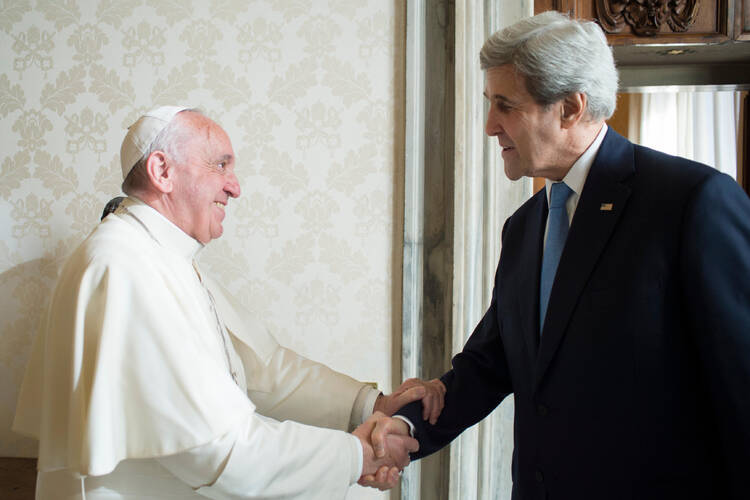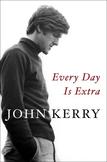The Gospel According to John Kerry
Lieutenant (junior grade) John Kerry was wearing a St. Christopher medal when he led his Navy swift boat crew on a charge into enemy fire along the Bay Hap River in South Vietnam in February 1969, dispatching a Viet Cong soldier who had targeted them with a rocket launcher and earning the Silver Star.
Kerry returned from the Vietnam War with doubts about his Catholic faith. He had asked God to protect him in combat. But how, he asked, could a merciful God allow the carnage of war, the maiming of children? Was it God’s will that some of his closest friends should die?
The story of Kerry’s faith journey is among the most evocative parts of the new memoir by the former Democratic presidential candidate and secretary of state and gives the book its title. “When I came home from Vietnam, I lived with gratitude that every day was extra,” he writes, “but all the words about God’s will working in strange ways fell on deaf ears for me.”
It was as a newly elected U.S. senator from Massachusetts, when he began to attend a Senate prayer breakfast every Wednesday at 7 a.m. at the Capitol, that Kerry says he was pushed to resolve the questions of what his Catholic faith “really meant beyond the power of the sacraments and the comfort of the rituals.”
At the bipartisan weekly breakfast, senators would describe how a relationship with God helped them navigate life’s trials. Bob Dole, the Republican majority leader, described how his family’s church in Russell, Kan., rallied around him when he came home from World War II in a full-body cast with a withered arm. Ted Kennedy, Kerry’s avuncular Massachusetts colleague, keeper of Camelot, spoke of how his own Catholic faith helped him endure the deaths of so many beloved family members. “After that day, I thought differently about the pain Teddy carried with him, the suffering hidden behind that twinkle in his eyes,” he writes.
The story of John Kerry’s faith journey is among the most evocative parts of Every Day Is Extra, by the former Democratic presidential candidate and secretary of state.
Kerry also began reading: Paul Tillich, Reinhold Niebuhr, Billy Graham, St. Augustine, Thomas Aquinas, Pope St. John XXIII. He befriended an evangelical lay minister, Doug Coe, the leader of the National Prayer Breakfast, who sent him articles and excerpts from Scripture. “The hardest and highest barrier for me to get over in reconciling my faith with my experiences remained the issue of human suffering,” Kerry writes. He kept coming back to the deaths of, in Vietnam, one of his closest friends from Yale, Dick Pershing, and of a fellow swift boat skipper, Don Droz. “I just refused to see God’s hand in their deaths,” he writes.
A turning point came in his reading of Pope St. John Paul II’s apostolic letter “Salvifici Doloris,” on “redemptive suffering.” Evil in the world, not God’s will, was the cause of suffering: “God hadn’t fired those rocket launchers into pilothouses on the Mekong Delta, and God wasn’t directing Tet when rocket fire stopped twenty-four-year-old Lieutenant Dick Pershing from searching for a fallen comrade,” Kerry writes. “However, God had been there to bring Dick and Don home, to ‘deliver them from evil,’ to bring their suffering to an end, as He had for His only son, whom He had given to the flesh.
“Suffering brought us closer to understanding what Jesus himself endured on the cross, how extraordinary it was that even as he was slowly tortured to death, he prayed for his captors,” Kerry writes. “Evil was all around us and it brought suffering, but rather than inflict it, God relieved suffering throughout eternal life, the mystery of which was the basis of faith itself.”
Kerry gave a talk on redemptive suffering at the Senate prayer breakfast. Afterward, Ted Stevens, the conservative Republican senator from Alaska, known for his volcanic temper and a champion of Arctic drilling, approached and touched Kerry on the elbow.
Stevens told Kerry about his life with his wife, Ann, with whom he had five children and a life filled with joy. Ten years after Stevens came to the Senate, he and his wife were in a plane crash: She suffered and died next to him, and there was nothing he could do. He had spent years asking why God had let this happen.
“He told me he wished that someone had shared with him then what I had just talked about at breakfast,” Kerry writes. “Thank you,’ he said, tapping me on the shoulder again and disappearing down the hall.
“I never looked at Ted Stevens in the same way after that day,” Kerry writes. “No matter which side of a debate we’d be on—and frequently it was the opposite side—because of the common ground we’d found together that morning, Ted was no longer just one of the Republican senators. He was a friend.”
This story strikes a chord in the wake of Senator John McCain’s funeral, at which suffering, reconciliation and bipartisan respect—things that need voicing in a topsy-turvy political age—were prominent themes. One thinks of the emotional eulogy by Joe Biden, the former vice president, whose first wife and 1-year-old daughter died in an auto accident and whose eldest son was taken three years ago by the same cancer that took McCain. Biden, a liberal Democrat, was a close friend of the Republican McCain’s.
So was John Kerry. Theirs was an unlikely friendship, starting as it did across the gulf of the Vietnam War. McCain, who had been tortured as a prisoner of war in Hanoi, campaigned for Kerry’s Republican opponent in 1984, denouncing the Democrat for joining the veterans who tossed medals and ribbons over the Capitol barricade in 1971: The North Vietnamese had taunted the U.S. P.O.W.s with accounts of that anti-war rally, according to The Boston Globe.
In Every Day Is Extra, John Kerry describes how, as the Democratic presidential nominee in 2004, he considered asking John McCain to join him on a unity ticket.
But Kerry and McCain formed a bond when they worked together in the early 1990s to resolve questions of missing P.O.W.s in Vietnam and pave the way toward renewed relations with the Southeast Asian nation. Together they concluded that it was time to put the war to rest, the Globe writes. Kerry came to earn the “unbounded respect and admiration of McCain, who called Kerry ‘the genuine article.’” At McCain’s passing in August, Kerry praised the late senator’s ability to find common ground even when it seemed improbable. “I loved John’s will to fight but respected even more his power to forgive,” Kerry said.
Kerry describes in his memoir how, as the Democratic presidential nominee in 2004, he considered asking the Republican McCain to join him on a unity ticket as his running mate. They “talked about it without talking about it,” he writes, but McCain was not prepared to break from the G.O.P., and the idea came to nothing. One thinks of what might have been.
Every Day is Extra spans Kerry’s life, beginning with his rarified upbringing as the son of a foreign service officer and descendant of Winthrops and Forbeses, at private schools in Switzerland and New England and at homes on the coast of France and private islands in Buzzards Bay. The book takes him to Yale, where he was inspired by John Kennedy’s “best and brightest,” and then to the Navy, his crowded hours in Indochina and his return to lead Vietnam Veterans Against the War. He describes his political rise, from Massachusetts to the U.S. Senate, his run for the presidency in 2004 and his service as President Obama’s secretary of state. He writes of the sorrows surrounding the breakup of his first marriage; the reconciliation with his first wife before her death from cancer; and the joy he has found in his second marriage, to Teresa Heinz.
The book also is what it is: a politician’s memoir. Asked on CBS’ “Face the Nation” over Labor Day weekend if he were considering another run for president in 2020, Kerry did not dismiss the question. The image on the cover, an early 1970s photo of a young Kerry, with shaggy hair and turtleneck, mistily captured in thoughtful reverie, captures the tone: In these pages, he is ever the Young Man Asking the Big Questions and Speaking Truth to Power.
A Doonesbury strip from 1971 captures this persona. “Hey, BD!” Mike Doonesbury remarks to his football-helmet wearing companion. “John Kerry of the Vietnam Vets is speaking at the auditorium! Wanna go?” A voice from off-panel interjects: “You better!” It’s a long-haired young man in a military fatigue jacket. “If you care about this country at all, you better go listen to that John Kerry fellow,” he says. “He speaks with a rare eloquence and astonishing conviction. If you see no one else this year, you must see John Kerry!” BD asks: “Who was that?” Doonesbury replies: “John Kerry.”
This self-promotional impulse was noted early on: Not everyone, as has been remarked, brings a Super-8 camera with him to Vietnam. “We all knew he would run for president one day,” one swift boat sailor who went on joint missions with Kerry told The Boston Globe. “You figure you got the initials JFK, you are from Massachusetts and you are on a gunboat. It wasn’t hard to figure out.”
In the pages of Every Day Is Extra, John Kerry is ever the Young Man Asking the Big Questions and Speaking Truth to Power.
The Vietnam home movies do not figure in this memoir, nor does his actually throwing someone else’s medals over the Capitol barricade or various other colorful but not necessarily flattering details that accrue over a long career in politics and that many readers still will recall. Much is left out between the lines. An annotated version would be handy. Indeed, The Boston Globe biography of Kerry compiled at the time of his 2004 presidential candidacy makes a very useful resource for reading alongside.
Back to the Kerry faith. He was, it turned out, more accidental Catholic than ancestral. The Globe, researching his family history, discovered something Kerry himself had not known: that his grandparents were Viennese Jewish immigrants named Kohn who upon immigrating, had changed both name and religious affiliation. Kerry’s father, lapsed in his own belief, nonetheless had wanted his children raised Catholic, to which his Protestant mother had conscientiously seen.
Kerry remarks on this twist of fortune when describing in his memoir the controversy during the 2004 presidential campaign when Archbishop Raymond Burke announced Kerry would be barred from receiving Communion in the St. Louis Archdiocese because of his pro-choice stance on abortion. A “wafer watch” ensued as the press followed, Sunday to Sunday, from city to city, to see whether Kerry would take Communion—which Kerry says he was not once refused. “If my faithful Episcopalian mother had told my agnostic father that she wasn’t going to raise the Kerry kids Catholic as he wished, I wouldn’t be having this fight,” he writes, ruefully.
The spin is self-serving. Kerry writes of how his Catholic faith informed his position against the death penalty, war and social inequality and for the environment, health care and social justice. But on the question of abortion, he writes he could not impose an article of faith on others who do not believe as the Catholic Church does. This was a convenient distinction for an ambitious Democrat in a party in which support for abortion rights had become a litmus test. It is easy to dismiss the three of 180 bishops who called him on it. But on defending society’s weakest, the unborn, what if Kerry had Spoken Truth to Power within the Democratic Party?
Again, one thinks of what might have been.
This article also appeared in print, under the headline “The Gospel According to John Forbes Kerry,” in the October 15, 2018, issue.










